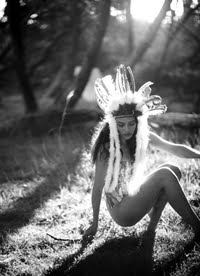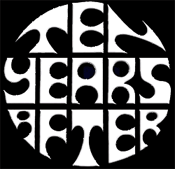


 Kaleidoscope was an American psychedelic folk and ethnic band who recorded 4 albums and several singles for Epic Records between 1966 and 1970. They formed in and around the Topanga Canyon area of Los Angeles.
Kaleidoscope was an American psychedelic folk and ethnic band who recorded 4 albums and several singles for Epic Records between 1966 and 1970. They formed in and around the Topanga Canyon area of Los Angeles.The group was formed in 1966. The original members were:
David Lindley
Solomon Feldthouse
Chris Darrow
Chester Crill
John Vidican
Lindley was an experienced performer on a variety of stringed instruments, notably the banjo, winning the Topanga Canyon Banjo Contest several years in a row. While studying at La Salle High School in Pasadena, he formed his first group, the Mad Mountain Ramblers, who performed around the Los Angeles folk clubs. There, he met Darrow, who was a member of a rival group, the Re-Organized Dry City Players. Soon afterwards, around 1964, the pair formed a new group, the Dry City Scat Band, which also included fiddle player Richard Greene (later of Seatrain), but Darrow soon left to set up a new rock group, The Floggs. Lindley also began forming his own electric group. In the course of this he met Feldthouse, who had been raised in Turkey and, on returning to the US, had performed flamenco music and as an accompanist to belly dancing groups. Lindley and Feldthouse then began performing as a duo, David and Solomon, when they met Chester Crill. They invited him to join their band, and by the end of 1966 added Darrow and drummer John Vidican, so forming The Kaleidoscope.
The group was founded on democratic principles – there was no "leader". They soon began performing live in clubs, winning a recording contract with Epic Records. The first single, "Please", was released in December 1966. It was produced by Barry Friedman (later known as Frazier Mohawk), as was their first album Side Trips, released in June 1967. The album showcased the group’s musical diversity and studio experimentation. It included Feldthouse's "Egyptian Gardens", Darrow’s "Keep Your Mind Open", and versions of Cab Calloway's "Minnie the Moocher" and Dock Boggs' "Oh Death". Crill, for reasons he never made clear (but ex-bandmates speculated had to do with concerns over reactions from his "straightlaced" parents), was credited as "Fenrus Epp" on the first album and adopted various other pseudonyms on later recordings.
Between them, the group played a huge collection of stringed instruments in such early psychedelic songs as "Egyptian Gardens" and "Pulsating Dream." They played fusions of Middle-Eastern music with rock in longer pieces such as "Taxim," which they performed live at the Berkeley Folk Festival on July 4, 1967. Live, band numbers were sometimes interspersed by solo instrumental turns from Feldthouse or Lindley, and occasionally Feldthouse brought belly dancers or flamenco dancers on stage.They were such adept musicians that they could play in many different styles, including rock, blues, folk, jazz, Middle-Eastern and also were not afraid to feature music by Calloway and Duke Ellington in their repertoire. Kaleidoscope were one of the progenitors of World Music.
Their 1967 piece "Stranger in Your City"/"Beacon from Mars," recorded live in the studio, was also influential, with Led Zeppelin's Jimmy Page calling them his "favourite band of all time." It featured a solo by Lindley in which, on stage, he used a violin bow on electric guitar, probably inspiring Page to use the same effect later. Another influential guitarist, Eddie Phillips of UK psych group 'Creation', was using a violin bow on a guitar as early as 1966. The album A Beacon from Mars was released in early 1968, to generally good reviews but poor sales. Liner notes to the CD reissue of this album claim the original title was "Bacon From Mars" but it was misprinted.
The band recorded their third album, Incredible! Kaleidoscope, in 1968. It featured "Seven-Ate Sweet", a long progressive instrumental piece in 7/8 time signature which they had been playing live since the early days of the group. The album reached #139 on Billboard in 1969, the only Kaleidoscope album to chart. Around this time they also did soundtrack work on educational and other films, and also made a triumphant appearance at the Newport Folk Festival.
Kaleidoscope’s fourth and final album (as a band), Bernice, featured more electric guitar work than the earlier albums, and more country influence. There were further personnel changes, adding singer-guitarist Jeff Kaplan, and bassist Ron Johnston who replaced Brotman during the making of the album. Feldthouse also left the group.
At the end of 1969, Kaleidoscope contributed two new songs ("Brother Mary" and "Mickey's Tune") to Michelangelo Antonioni's Zabriskie Point, and supported Cream on their American farewell tour. The band split up soon afterwards.
KALEIDOSCOPE live 1967/68
Audience Tapes - Sound is good for it's age
1 Oh Death
2 Taxim
3 Egyptian Gardens
(Berkeley Folk Festival 07-04-1967)
5 The Cuckoo
6 Maggie Mae
7 Hello Trouble
8 An Eastern Lullaby to Christopher Dee
9 Killing Floor
(Live at Shrine Hall; LA 08-04-1968)
10 Minnie the Moocher
11 Steppin' Out
12 Beacon from Mars
13 Boogaloo Down Broadway (David Lindley solo)
14 Taxim
15 (cuts in) Flamenco guitar/vocal (Solomon Feldthouse solo)
16 Steppin' Out
17 Seven-Ate Sweet
(Club 47 Cambridge, MA, US)
Probable date: December 1967






















































































12 comments:
Thanks for this.It is really a nice surprise,and sounds good!Grateful Boki,Zagreb
what a musical stew they cooked up.It was fun growing up in L. A.at this time. Thanks very much.
Very interesting and good music. What is the 4th track?
musicHunter
musicHunter
I am sorry but in my posting I did not retain the the fourth track's title
In reviewing the files it does not give a title If I manage to come across it I will update the post
Track 4 is probably another performance of Seven-Ate Sweet.
Any chance you could upload this again? Thanks in advance.
Thank you so much for the repost (on another page). Yes, track 4 is Seven-Ate Sweet. According to the Lama Workshop , it's from the Shrine Auditorium concert. The correct title of track 8 is Rampé Rampé.
Oh, and track 6 is not Maggie Mae, but Fannie Mae. It was originally recorded by Buster Brown, hence the reference to Tige in the spoken introduction.
Where may I find this reposted on ANother Site??I can't find it unfortunately
It's on this site. Find the post from November 30, 2013. Or search for "Kaleidoscope".
Hello,
I cannot find a living link for this
Is it possible for you to re-up, please
Thank you
Alex
hi, it's sad, no link ! ?
lou
Please repost ! Thanks in advance !
Post a Comment